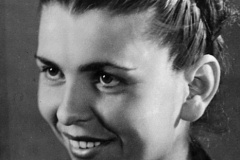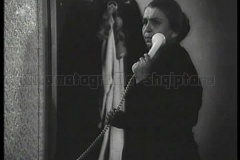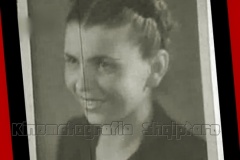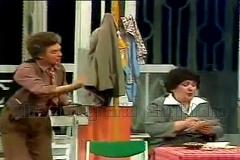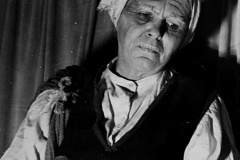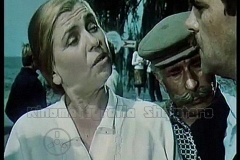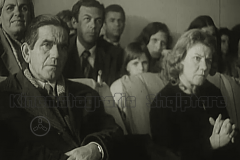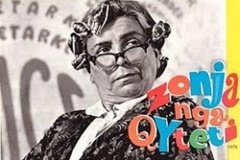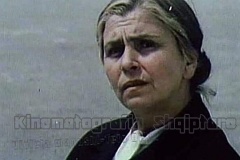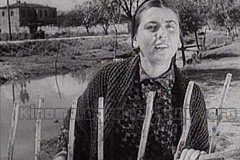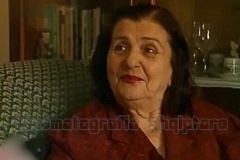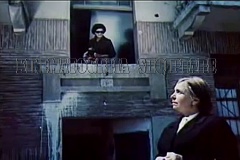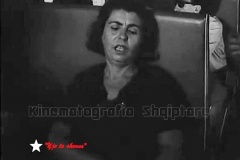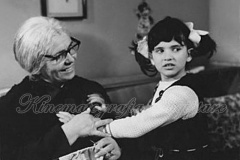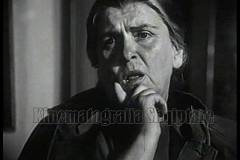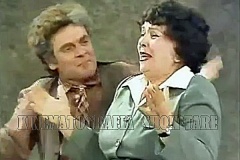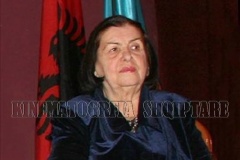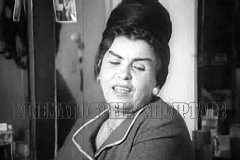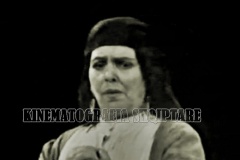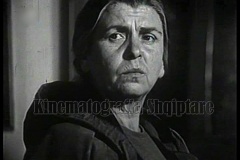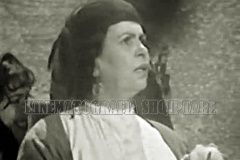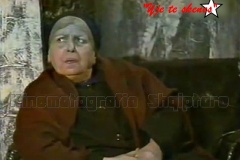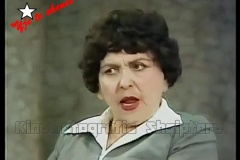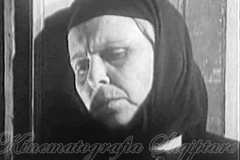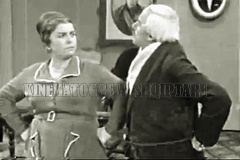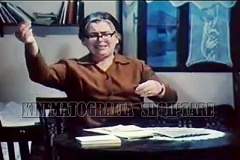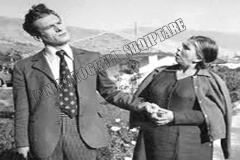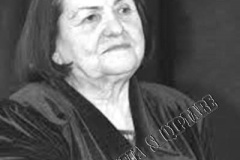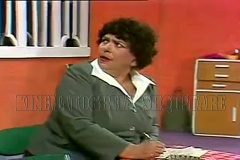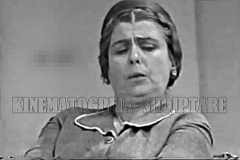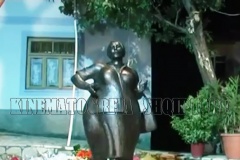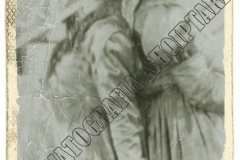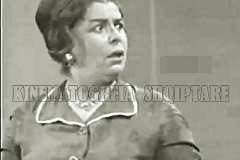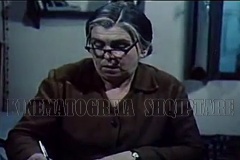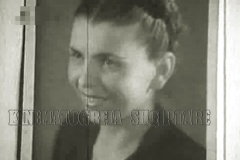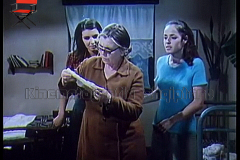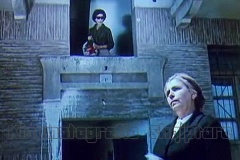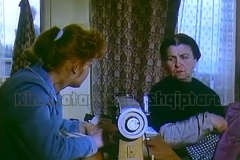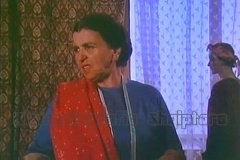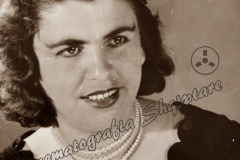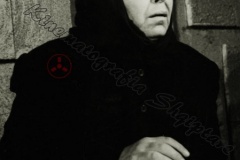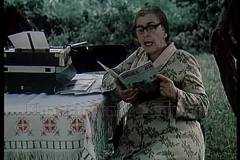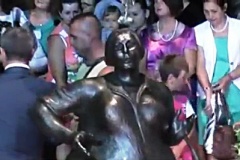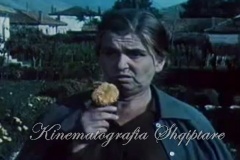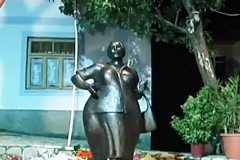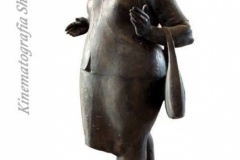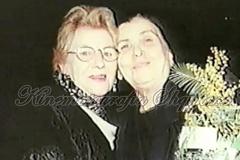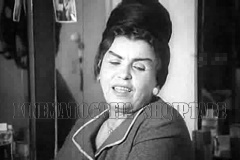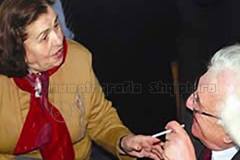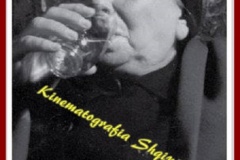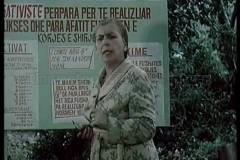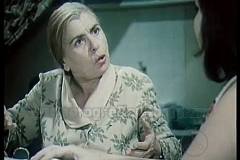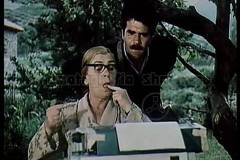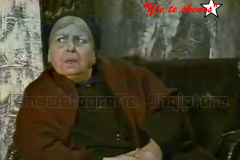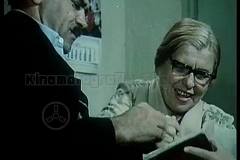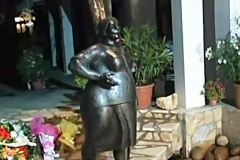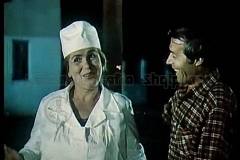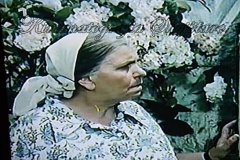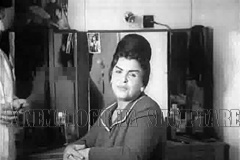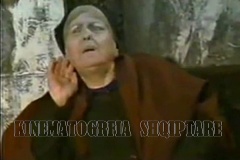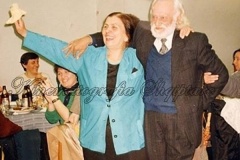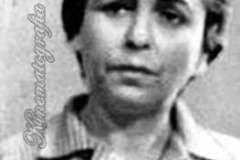Violeta Manushi
March 6, 1926 – July 26, 2007
People’s Artist, and “Honorary Citizen” of the Korce district.
Prominent Albanian theater and cinematographer actress.
“There was a lady who had a doughter…”
Among the symbolic characters of Albanian comedy, Teto Ollga remains in the films “Lady from the City” and “A Comradess from the Country”, precisely the “People’s Artist” Violeta Manushi knew how to embody this figure with her talent so that she is identified by the entire Albanian audience as Ollga. , the worldly lady of the city.
Born on March 6, 1926, in Korce. She never separated from the artistic creativity of the stage until the last moment of her life, film and theater for the great actress was an inseparable part of her. Thus, at the age of 80, in 2006, she came out to play the drama “Shelter of the Forgotten” at the National Theater alongside a constellation of prominent actors opening the nationwide Albanian drama festival.
In an interview on BBC Shqip, she will say that it was an emotion, like the first day when she went on stage, because at this festival it was the relay that it would be passed to the actors of the new generation of the Albanian theater. The emotions were strong, and the drama was welcomed by the audience who applauded her and the actors on stage.
It was important to open this national festival of Albanian drama, which returned after a long period of absence. “Albanian drama has lost its footing and this is not right”, the great actress would say – because it will not be me in England who plays Shakespeare because the Englishman plays it themself, but it will be me to play “Carnavals of Korce”, I`ll present our culture, bring out the popular figure, and this honors me”!
Violeta Manushi entered the stage by chance, she did not have any hidden dreams of becoming an actress. She comes from a very poor family, as she declared, “even a head of leek was a jewel at that time.”
Her father was very sick and could not work alone, and her mother tried to support the family, which consisted of 7 people, 4 girls and a boy. As soon as she finished the fifth grade, Violeta was forced to work washing bottles to make ends meet in a workshop during the Italian occupation, and she was the only female worker there.
It will not last long because the workshop will go bankrupt. In the end, she will end up a typographer. However, after the liberation of Albania, Violeta would find her working as a typographer in a printing house, because her older sister was getting married in Tirana, and thus she had taken Violeta with her.
But the troubles for the future actress would not end. With the arrival of the father in Tirana, the war begins on the wide front and all the roads are blocked, leaving the rest of the family alone in Korce without any support and money, her mother with her sisters and brother. The family, however, finds the help of Korcar residents, a street vendor of vegetables will help them from time to time. With the end of the war and the complete liberation of the country, the whole family reunites in Tirana.
Artistic beginnings
After the liberation of the country, May 1st will be decided to be a big official holiday and celebrate in an organized way. On this occasion, the army ensemble led by Gaqo Avrazi had prepared a drama “Doctor Efemiu”, a scene in which the women of the village forced Qehajai to go with difficulty to the grave of Beu’s wife to cry because no one was there… Violeta was very young in age will meet the stage for the first time in her life.
The people who dealt with the makeup and costumes will need a long time to change her appearance in such a way that she looks a little broken in age. Meanwhile, it is heard that E. Hoxha himself has come and the whole government to follow appears to the people, they were late and they had to be ready to start it.
Violeta just looks at herself in the mirror, how they have deformed her, she tried to run out towards the door, but some hands grab her and shout at her to sit down and get ready, the troupe had been preparing for this show for a long time, and they had nowhere to find the next one, to replace it.
Well, Violeta came on stage, but she didn’t even remember the lyrics or the moment when she had to cry. Someone from behind her, after “threatening” her to speak, hit her on the back so hard that tears started to flow from the pain, and for all present there was an original scene where there was a lot of applause.
The show was over, but Violeta was confused because she couldn’t understand what had happened and remembering that she hadn’t made any mistakes she was scared. as it was, she leaves the scene and runs away without anyone’s knowledge. Others are looking for her.
She had left an impression on everyone with her performance, but she was nowhere to be found.
The amateur theater that was born during the war in the mountains by the partisans requested that it be offered as well, but Violeta always opposed “No and no” even after a year from its first performance. –
“What? why do I have to go back to the theater they beat me in front of the audience, I wasn’t crying because it was written in the text but because of the pain” – she will testify it with a smile a later time. But it was also the opinion of the time towards women who did not look favorably on those who played on stage.
Her people, her parents, would talk to her for a long time, telling her that she should build her life differently without the economic difficulties that had accompanied her family, if she continued with seriousness and appreciation of her work, as she had done until then, wherever they always sent her, success would be ahead of her.
So that in April 1946, she became a member of the collective of the “Teatri Popullor” and since then she will not be separated from theater and film not for a single moment. In order to reach the success and popularity that she enjoys among the Albanian public today, she needed not only a great job, but also self-confidence and self-belief in what she would do. In relation to this, she herself would express her doubts that: “…if you had looked at me when I was young, even from the way I dressed, I could have been anything but an actress, an artist…”
Others tried to convince her that she was, on the contrary, a talented girl, but she answered crying that she could not become an artist. But Violeta won and the successes would follow one another, comedy films that will be remembered from “Carnivals of Korce”; “The General of the Dead Army” to the most famous “The Lady from the City” and “A comradess from the Country”
The great actress has excelled both in comedy (Ollga in “The Lady from the City”) and in drama (Nica in “The General of dead army”). Counts over 100 roles in the theater and 16 in the cinema.
In May 2006, she successfully returned to the stage of the National Theatre, with the tragicomedy “Shelter of the Forgotten”.
The former typographer, only 20 years old, enrolled in the first drama school, opened near the State Theater (today TK), in 1946. Immediately stood out for authenticity, spontaneity and rare naturalness, but also discipline and iron will.
In the drama “Kremlin Clocks” (1957) she played three roles at once, setting an original record that still stands. Then she excelled in the lead roles in the comedies “The Merry Wives of Windsor” (1959) and “The Morality of Mrs. Dulska” (1958).
From the national dramaturgy, Manushi very successfully interpreted Olimbia in “Carnivals of Korça” (1964), Zyhra in “The Second Face” (1968), Nica in “The General of the Dead Army” (1971), Ollga in “The Lady from the City” (1975) and “teto” role in “Palace 176” (1985), being completely transformed in each of them.
Violeta Manushi also played in 16 films, from “Tana” (1958) to “Small Encirclement” (1989) and a teledrama “The General of the Dead Army” (1976). For the role of Aunt Ollga in “Lady from the City” she won the Medallion of the Film Festival in 1977.
FILMOGRAFIA
Tana – (1958)
Debatik – (1961)…..Maria
First Years – (1965)…Lonevica
Old Wounds…Ver`s mother
The Trace – (1970)……..mother-in-law Artani
“Mimosa the spoiled kid / Mimoza llastica” – (1973)…..grandmother
General of the dead army (1976)……Nica
Lady from the city – (1976)…Ollga
Hearts that don’t grow old – (1977)
Beyond the stone walls – (1979) …grandmother
A comradess from the country – (1980)….Olga
Taulanti is looking for a sister (1984) …Aunt
Small Encirclement – (1986) ….Frosa Guri
One morning phone – (1987)…. Kujtim`s mother
Come! – (1987)
The sadness of Mrs. Shnajder – (2008) film shot in 2005, before she died
THEATER
“Qypi me flori”
“Epopeja e Ballit Kombëtar”
“Dom Gjoni”
“After Death”
“Halili and Hajria”
“Tartufi”
“Micro Bourgeois”
“Deep Roots”
“Kremlin Clocks”
“The General of the Dead Army”
“The Morality of Mrs. Dulska”
“Arturo Ui”
“The Dead River”
“Carnivals of Korca”
“Lady from the City”
“14 Years Groom”
“Cuca e maleve”
“The Era Before the Trial”
“Noble Bourgeoisie”
“The Second Face”
“Palace 176” (1985)
“Titanic Waltz” (1990)
“Sixth Floor” ,
“Oldest profession”
“Shelter of the forgotten”
It was published for the first time on Facebook on the “Albanian Cinematography” page in July 2013 and was reviewed in the following years
____________________________
Albanian Cinematography in activity since 2013
Reference: Interview of the actress in BBC Albania, and various online articles from Albanian newspapers.
Follow us: Blog: https://albaniancinematography.blogspot.com/ Facebook: https://www.facebook.com/ksh.faqjazyrtare Dailymotion: https://www.dailymotion.com/kinetografiashqiptareartisporti YouTube: https://www.youtube.com/channel/UCDRYQ5xCyGkfELm3mX8Rhtw
Discover more from Albanian Cinematography - Sport
Subscribe to get the latest posts sent to your email.

